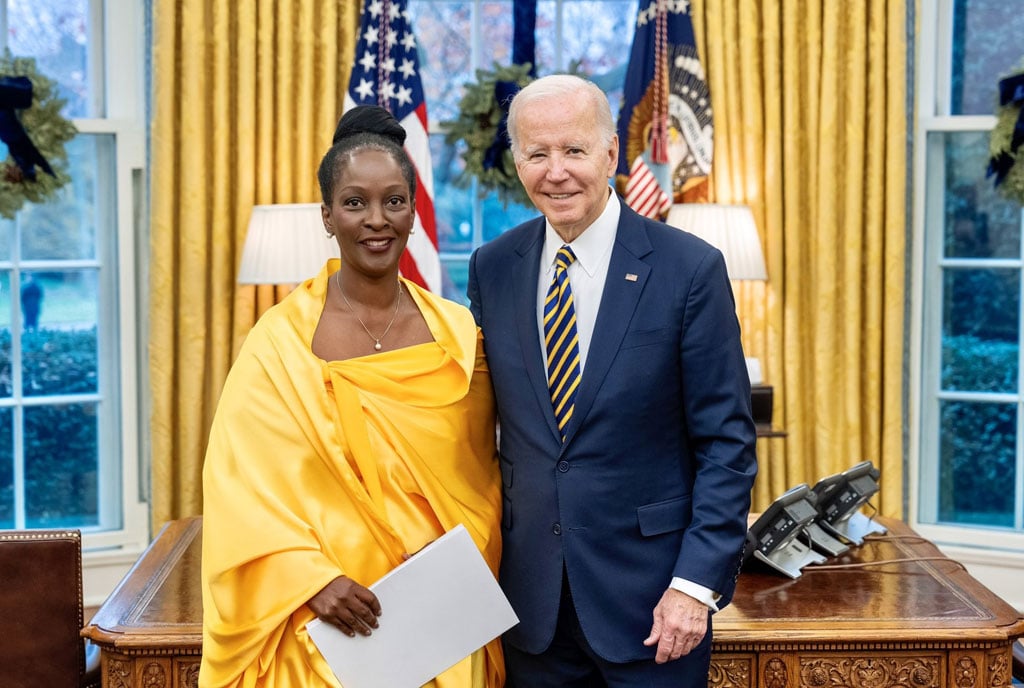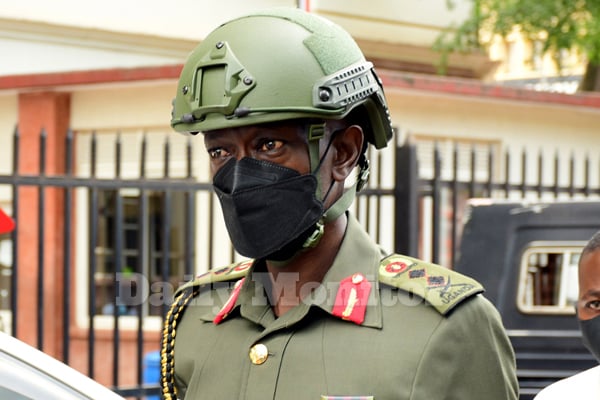Prime
Kakonge’s tough job of smoothing ties between US, Uganda

Ambassador Robie Kakonge and US president Joe Biden. PHOTO/HANDOUT
What you need to know:
- It is coming to a year since Robie Kakonge was appointed to represent Kampala in Washington DC, replacing Mull Katende.
- Derrick Kiyonga writes that while relations between the two countries have worsened, thanks to Kampala’s enactment of the anti-homosexuality law, Kakonge insists that Uganda’s relationship with the global superpower shouldn’t be defined by homosexuality.
Washington DC, the capital of the United States of America, is known for being a global centre of power.
When you are in Washington, power is what you experience as it pulses through its veins and threads to its DNA. Power in Washington shifts: From those who have it to those who challenge it.
It was in the fall of last year that Robie Kakonge arrived in Washington to present her credentials to Joe Biden, the American president, as Kampala’s representative to the US.
It turned out to be a roller-coaster as hours later, she was receiving her boss, President Museveni, who had jetted in to attend the US-Africa Leaders’ Summit.
“If I hadn’t given President Biden my credentials, then I wouldn’t have been able to receive the President [Museveni]. Everything happened so quickly,” Kakonge says.

Left to right: First Daughter Natasha Karugire, President Museveni and his US counterpart Joe Biden and Jill Biden at the White House in US during the US-Africa leaders summit in December 2022. PHOTO/PPU
As much as a lot of its attention has been on the full-scale war Russia waged on Ukraine, the US has not taken its eye off Africa because it’s projected that by the end of this century, the continent will be home to approximately 40 percent of the World’s population.
Biden’s pledge
At the summit, Biden talked about Africa having a seat at the UN Security Council. Museveni focused on value addition, saying the US needs to show that it does not simply see Africa as an arena for influence, domination, and resource extraction which distressed Africa in centuries past.
“Collaboration between the US and Africa will enable the world to get cheaper medicines and vaccines. Because remember, our production costs are lower. So, if you want cheaper drugs, the place to go to is Africa,” Museveni said, adding that in the research he had done, they concluded that they needed 17 inputs of chemicals and reagents, including one called beta-Propiolactone.
“Our scientists told me that this was from cassava that we easily produce in Uganda. We are running around the labs to get beta-Propiolactone, but this is made from cassava. It’s not correct to produce very expensive medicines on account of using expensive inputs when countries like Uganda can produce those inputs,” Museveni said.
For Kakonge, Museveni’s presentation was the icing on the cake, having taken time to arrive in Washington.
“The President is really respected globally because of his efforts in the fight against HIV/Aids, Ebola, and recently Covid-19,” Kakonge says. “So, when he speaks about health-related issues, they have to listen to him.”
Granted, the US-Africa Summit went on well, but by the time Kakonge arrived in Washington, the relations between Uganda and the US were on a downward spiral.
Travel ban
In 2021, the Department of State announced a blanket travel ban on Ugandan government officials, whom they didn’t name, accusing them of getting involved in gross human rights violations and undermining democracy during and after the January 14 General Election, which Museveni edged by 58 percent amid protests from the Opposition that the election was nothing but a work of fraud.
“Opposition candidates were routinely harassed, arrested, and held illegally without charge. Ugandan security forces were responsible for the deaths and injuries of dozens of innocent bystanders and Opposition supporters, as well as violence against journalists that occurred before, during, and after the elections,” Mr Anthony Blinken, the Secretary of State, said in a statement.
Washington has sanctioned Museveni’s Generals, starting with former police chief Gen Kale Kayihura in 2019 and late last year Maj Gen Abel Kandiho, who at the time headed the Chieftaincy of Military Intelligence (CMI).

Maj Gen Abel Kandiho. PHOTO/DAVID LUBOWA
He was sanctioned by the US Department of the Treasury’s Office of Foreign Assets Control (OFAC) together with high-profile Iranian and Syrian officials for serious human rights abuse and repressive acts targeting innocent civilians, political opponents, and peaceful protestors.
To smooth relations between Kampala and Washington, Kakonge in typical diplomatic speak says there have been “constructive” engagements, but relations have not got any better following Uganda’s move to enact the Anti- Homosexuality Act, and it’s now facing a challenge in the Constitutional Court.
As soon as Museveni signed the Bill into law, Biden issued a statement castigating the entire law as shameful.
“The enactment of Uganda’s Anti-Homosexuality Act is a tragic violation of universal human rights – one that is not worthy of the Ugandan people, and one that jeopardises the prospects of critical economic growth for the entire country. I join with people around the world – including many in Uganda – in calling for its immediate repeal. No one should have to live in constant fear for their life or be subjected to violence and discrimination. It is wrong,” Biden said in a statement.
“This shameful Act is the latest development in an alarming trend of human rights abuses and corruption in Uganda. The dangers posed by this democratic backsliding are a threat to everyone residing in Uganda, including US government personnel, the staff of our implementing partners, tourists, members of the business community, and others.”
The passing of the law wasn’t going to make Kakonge’s job of easing tensions between the countries any easier, but she says the most important thing is for the Americans to understand that the two countries can agree to disagree.
“This is about values. In Uganda, the belief is that the law is critical in protecting the family and children. Of course, some Americans don’t agree, but this is not something that should define the relations between Uganda and the US,” Kakonge says.
“We have a relationship that has been on for more than 60 years. We can’t take anything for granted. We have to ensure that our interests are mutual.”

Ambassador Robie Kakonge and US president Joe Biden. PHOTO/HANDOUT
Although Washington has threatened to withdraw aid on the account of passing the Anti-Homosexuality Act, Kakonge insists the topic is equally divisive in the US.
She cites a case in which a judge in the liberal bastion of California ruled in favour of a bakery owner who refused to make wedding cakes for a same-sex couple because it violated her Christian beliefs.
Cathy Miller, the owner of the bakery, was sued by California’s Department of Fair Housing and Employment on grounds she intentionally discriminated against the couple in violation of California’s Unruh Civil Rights Act, but the judge agreed and ruled that the baker had acted lawfully while upholding her beliefs about what the Bible teaches regarding marriage.
“We have to agree on this issue [homosexuality]. Even in the West there is no unanimous agreement. If the courts are ruling like that in the West then why don’t they expect Ugandans who are naturally conservative to think differently from them? I think we just have to respect each other and look at things that unite us, not those that divide us,” Kakonge says.
She could represent Uganda at the highest level of diplomacy, but Kakonge before being appointed wasn’t a career diplomat as she was tapped from the private sector.
“It has been a learning curve, we were oriented by the Ministry [of Foreign Affairs]. I have been meeting various diplomats, deans of diplomats from whom I have learned a lot,” Kakonge says. “I have now come to learn about digital diplomacy, in the post-Covid-19 era.
You find that in this first year I have had a lot of transition for many meetings being virtual.”
Kakonge’s adaptation process wasn’t made easy by the fact that Uganda’s foreign mission, which has a total of up to 38 missions, has been hamstrung by financial cuts.
“You have to work with what you have. Of course, ideally, as a foreign mission, you would want more resources but you have had to understand that countries are struggling with the aftereffects of Covid-19. We have to work and serve the country with what we have, “she explains.
One of Kakonge’s tasks is to attract investors to Uganda, a job she says hasn’t been made easy in Uganda’s small market.
“One of the things we have been doing is to market Uganda in the US, but I always get feedback that Uganda is a very small market. My response has been that in investing in Uganda, they should be looking at East Africa. Uganda is like a gateway to the entire region which has a very big young population,” she says.
The recent report released by the State Department on the investment climate didn’t do Kakonge any favour as it shows Uganda has a lot of work to do if it is to attract American investments.
Museveni and government officials, the report says, vociferously welcome foreign investment in Uganda but government’s actions sometimes do not support its rhetoric.
“The closing of political and democratic space, poor economic management, endemic corruption, growing sovereign debt, weak rule of law, growing calls for protectionism from some senior policymakers, and the government’s failure to invest adequately in the health and education sectors all create risks for investors,” the report says in part.
US firms often find themselves competing with third-country firms that cut costs and win contracts by disregarding environmental regulations and labour rights, dodging taxes, and bribing officials,” the report said, adding that shortages of skilled labour, a complicated land tenure system, and increased local content requirements, also impede the growth of businesses and serve as disincentives to investment.
They are issues that Kakonge can’t solve, but she insists Uganda is the right place for investors across the globe.
“We are blessed with many resources; no wonder we attract tourists from across the world. We have fertile lands, we have good climate conditions, and we have a youthful population that you can work with. We shall continue preaching this gospel to investors,” she says, adding that representing Uganda in the world’s leading economy comes with its specific expectations.
“America is super and when you are here, you have hundreds of other countries positioning themselves in the nation’s capital. You have to be strategic, connect, and engage and I think just like any relationship you just don’t take things for granted,” she says.





